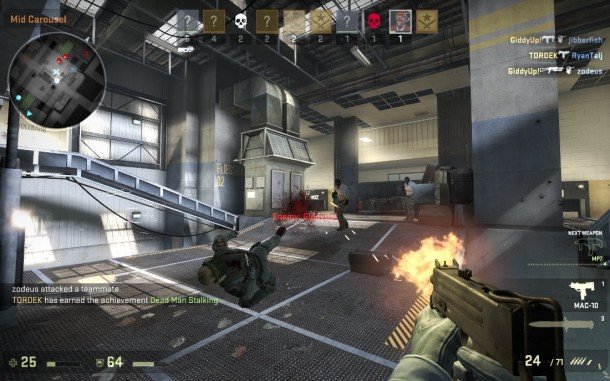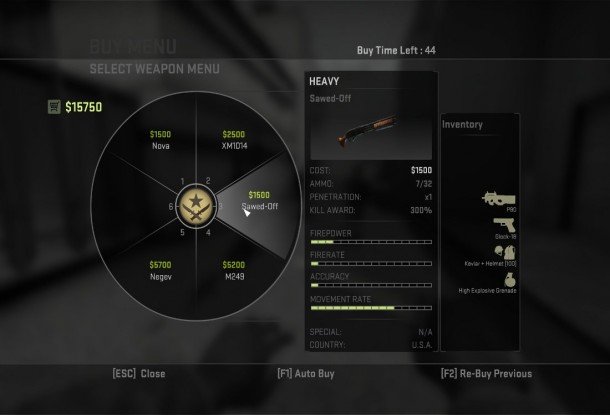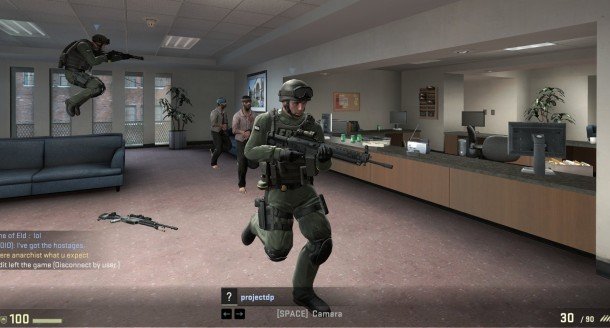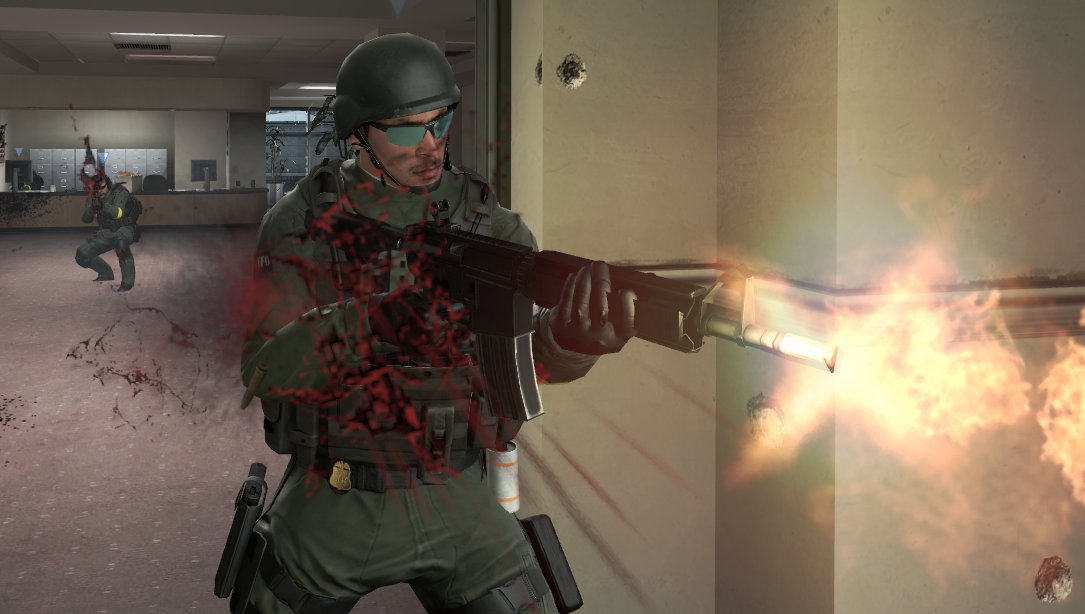Our Verdict
A $15 invitation to reconnect with a classic FPS.
PC Gamer's got your back
I've determined that Counter-Strike: Global Offensive is from another dimension. It's a game that doesn't need to exist. PC gamers (thousands of them, according to SteamGraph ) are perfectly served by Counter-Strike: Source and CS 1.6 , content with the decade-something of tuning and attention those games have received.
But here's GO: full of doppelganger Desert Eagles and de_dust déjà vu, quantum-leaping from some parallel timeline whose game industry briefly intersected with ours. Playing it is like running into a college crush at the supermarket. You immediately notice differences. Oh, you're married? Your hair looks different. But that experience of reconnecting is pleasant—they're mostly still the person you admired during geology.
In other words, GO's familiarity helps and hurts. Minor deviations from the CS you might've known or loved are easy to identify. The MP5 is now the MP7, but it lacks the same clicky report and underdoggy “this is all I can afford, please don't kill me” personality. The TMP is replaced by the MP9. Ragdoll physics don't persist after death, curiously. You can't attach a suppressor to the M4 for some reason.
I'm not particularly bothered by this stuff; I don't need the MP5 reproduced precisely as it existed in 2004 or 2000 to live a fulfilling life. What does bug me are some small but significant changes to firing feedback. When you shoot someone in GO, they don't wince. There's a sneeze of blood, and audio that conveys that you're hitting them if you're within a certain range. But they don't do this , and I don't understand the decision to omit a flinch animation on character models.
Especially at long range, it takes a little more effort and squinting than it should to tell if I'm hitting someone or not. And counterintuitively, bullet tracers, new in this version of CS, are an unreliable source of feedback. They seem to trail the path of your actual bullet by a few microseconds. With rifles and SMGs, my eyes would wander away from my enemy and crosshairs--what I should be watching--and try to interpret where my bullets were falling based on the slightly-delayed, streaky particle effects. The small upside to tracers is that they mitigate camping a bit.

de_dust2.0
The changes made to existing maps are clever and careful, though. Cracked glass is more opaque, making it modestly more difficult to go on a sniping rampage in areas like cs_office's main hall. Adding a stairway to the bottom of de_dust makes the route more viable for Terrorists while retaining that area's purpose of a bottleneck; moving the B bombsite closer to the center of the map discourages CTs from hiding deep in their spawn point.
Considering these smart adjustments to classic maps, it's puzzling that GO's “new” mode and the new maps bundled with it are so gosh-darn mediocre. Half of GO's 16 total maps are new, but they're all locked to the Arms Race (a rebrand of the famous community-created mod GunGame) and Demolition (GunGame sans insta-respawn, plus bomb defusal) modes.
After 50 hours logged, I've stopped playing these modes completely. In the shadow of Valve's talent for mode design (Scavenge in Left 4 Dead 2, Payload in Team Fortress 2), Arms Race and Demolition are safe, unimaginative, and most of us have played their predecessor. I would've loved to see VIP scenarios revisited. It presents a ton of design headaches (if your VIP isn't good, everyone hates them forever), but it's an experience that's absent from modern FPSes.

But yeah, the new maps. Aesthetically, they're likeable. de_bank mirrors the indulgence of fighting around Burger Town in Modern Warfare. de_lake and de_safehouse let you duel inside a multi-storied cottage and on its surrounding lawn. But tactically, they're trivial compared to their parent maps. Most of them are compact (de_shorttrain is literally an amputated de_train) and designed to support instant-action, meat-grinder gameplay that reminds me more of Call of Duty.
What I'm lamenting, I guess, is that Valve and Hidden Path missed an opportunity to add a new classic map to the lineup--something that could've joined the legendary rotation of Office, Italy, Dust, Dust2, Aztec, Inferno, Nuke and Train. They could've tidied-up lesser-known but beloved community maps like cs_estate or cs_crackhouse. Instead, the eight we get feel more like paintball arenas--too fast, relatively fun, but frivolous. They lack the personality, purpose, or tactical complexity of their predecessors.
Pure
Even with these questionable adjustments and shrug-inspiring new maps, GO produces quintessential Counter-Strike moments. Being the spear-tip of a rush with a P90. Being the last person on your team and feeling the glare of your teammates as you try to win the round. The feeling of each kill you make increasing the safety of your teammates. Knife fighting for honor. Accidentally blinding your team with a misguided flashbang and getting everyone killed. Building a rivalry with an AWPer over the course of a match. All of that is preserved.
GO is a $15 ticket to reconnect with those sensations; it retains CS' spirit as a competitive game driven by careful tactics, cooperation, and individual heroics alike. It's still a game about positioning, timing, and, say, thinking critically about how much footstep noise you're generating. GO preserves CS' purity in that regard--it remains one of the only modern shooters without unlockable content, ironsights, unlockables, or an emphasis on things like secondary firing modes.

Atop that, there are some touches that rejuvenate the game we've been playing for 12 years. The new scoreboard is terrific. There's both a server browser and a party system, if you prefer that. There's a slider for scaling the UI. New players can practice against bots offline. And although a few of the weapon models are unambitious (the Nova and sawed-off shotguns look like drug store toys; the AWP and the Scout resemble one another a little too closely), I love that there's multiple sets of character models for both teams--cs_office and cs_italy's Terrorists and Counter-Terrorists look and sound completely different.
I expect you'll like most of the new weapons, too: the PP-Bizon is a cheap, 64-shot SMG. The MAG-7 shotgun is slow-firing (and slow-reloading, as it's magazine-fed) but absolutely deadly. I like that heavy machine guns are no longer total novelties, and are viable in a few situations. The Molotov and incendiary grenade fold into Counter-Strike's core concept (iterating on tactics between rounds) beautifully because they're throwable walls of fire that can deaden the momentum of successful enemy tactics.
In summary: go, go, go. I'm hopeful that the competitive community will fill in the map and mode gaps left by Valve and Hidden Path. Zombie Mod is a good start.
A $15 invitation to reconnect with a classic FPS.

Evan's a hardcore FPS enthusiast who joined PC Gamer in 2008. After an era spent publishing reviews, news, and cover features, he now oversees editorial operations for PC Gamer worldwide, including setting policy, training, and editing stories written by the wider team. His most-played FPSes are CS:GO, Team Fortress 2, Team Fortress Classic, Rainbow Six Siege, and Arma 2. His first multiplayer FPS was Quake 2, played on serial LAN in his uncle's basement, the ideal conditions for instilling a lifelong fondness for fragging. Evan also leads production of the PC Gaming Show, the annual E3 showcase event dedicated to PC gaming.


